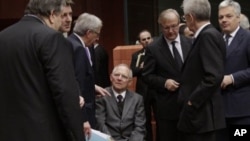Finance ministers from the 17-nation eurozone are holding another set of talks Tuesday and Wednesday on salvaging their common currency, amid more grim financial news.
New governments in Greece and Italy, two of Europe's most financially troubled countries, have not been enough to reassure markets that the European Union has a handle on its sovereign debt and banking crisis. In new signs of doubt, Italian bond rates are soaring, last week, credit agencies lowered their ratings for Belgium, Portugal and Hungary. And lending among European banks is shrinking.
As finance ministers meet in Brussels Tuesday and Wednesday, ideas are circulating for more radical fiscal changes. France and Germany want a stronger fiscal union among the 17 nations sharing the euro currency, with tougher budget commitments by member states. That idea was outlined by France's finance minister, Francois Baroin, on Tuesday.
Speaking on French radio, Baroin said the European Union should have two objectives; restoring global confidence in the short term and more budgetary and fiscal integration in the longer term.
EU finance ministers are also expected to discuss another option, eurobonds, essentially a way in which eurozone members guarantee each other's debts. But Germany, the most powerful EU member, opposes the idea.
Berlin is also against another idea, reinforcing the powers of the European Central Bank, to make it a so-called lender of last resort for the region.
The chief executive officer of the Brussels-based Center for European Policy Studies, Karel Lannoo, says even if EU nations can agree on some of these ideas, they will take time to implement.
"There are short-term issues which have to be decided almost immediately, like preventing the contagion from the solution of Greece, writing off part of its debt, from spreading to other countries," said Lannoo. "And long-term solutions, like seeing whether we can have a federal model, like you have in the United States, of financing the debt of members of the eurozone."
As the eurozone crisis has grown this year, so has criticism that European leaders have been too slow and timid in addressing it. Meeting Monday with top EU officials in Washington, U.S. President Barack Obama again raised concerns that Europe's problems may become America's problems.
"This is of huge importance to our economy if Europe is contracting or if Europe is having difficulties," said Obama. "Then it is much more difficult for us to create jobs here at home because we send so many products and services to Europe. It is such an important trading partner for us."
There is speculation that one or more members, starting with debt-strapped Greece, may leave the currency zone, triggering a domino effect. But Lannoo, for one, believes the eurozone will continue through the difficulties.
"Basically, I think there is no way back. You start to see some studies that look at the cost of a breakdown of the eurozone," said Lannoo, "the more you read about these things, the more you see this is almost unimaginable."
More bailout money for Greece and enlarging the EU bailout fund are also on the ministers' agenda. But the focus is on a December 9 European summit, as pressure mounts for leaders to resolve their debt crisis by the year's end.
EU Finance Ministers Discuss Ways to Save the Euro
- By Lisa Bryant















